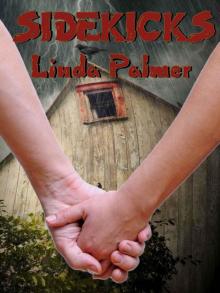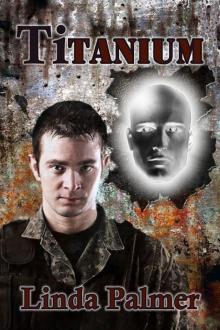- Home
- Linda Palmer
Kiss of Death Page 17
Kiss of Death Read online
Page 17
“It’s okay. I can be here as long as I want.” She hurried toward a hitching rail attached to the south wall, a dozen feet outside the riding ring, where a saddled horse with a reddish coat was tethered.
Returning with the red horse, Didi said, “This is Cinnamon. She’s a good one to get started on—kids ride her.” She took back Moon Glow’s reins and placed Cinnamon’s in my right hand. “Now to get on, you have to face the same way as the horse.”
I laughed. “That’s the one part I’m sure of.”
Didi said solemnly, “You think that’s funny, but you’d be surprised at some of the things I’ve seen people try to do on their first lessons.” She regarded my desert boots with a critical frown. “That’s not the right footwear. I guess it’ll be all right this time, but get some good riding boots.”
“Will you tell me where to buy them?”
For the first time since we met this morning, Didi smiled. “I know the best places for all the stuff you’ll need, and what bootmaker to go to. It’s much better to have boots molded to your foot. Those store-bought ones can mess you up.”
Standing as close as I was to Didi, I saw that the two inches of hair visible below her helmet were ragged at the ends, strong indication that she had done the cutting herself. The dark shade that had been shining with natural highlights only a few weeks ago was now dull and limp, and the healthy pink tint was gone from her lovely face. She’d lost some weight, too; her custom-tailored riding jacket was a little too big on her. Thinking of the grief she suffered, my heart went out to her.
Didi regarded me with the serious concentration of a brand-new teacher with her first pupil. “Put your left foot in the stirrup, and swing your right leg over the horse and get your foot into the other stirrup,” she said.
I did as instructed—a little awkwardly, but I got up on my first try. Once in the saddle, old muscle memories awakened and I automatically gripped the horse with my knees.
Didi vaulted easily into Moon Glow’s saddle, and now we were next to each other on our respective mounts.
“Hold the reins the way I am,” she said, demonstrating.
I did.
“Now copy what I do.” Didi inclined her head slightly toward Moon Glow’s neck and made a clicking noise with her mouth. Moon Glow started to move forward. I followed Didi’s lead and we walked our horses side by side around the ring. Didi was a patient teacher; before I realized it, I was feeling comfortable on horseback.
At first, from just inside the second ring, Mrs. Wood-bury watched us with narrowed eyes and an apprehensive frown. Then, apparently satisfied that Didi was being careful, her face relaxed and she turned away to check on other students.
“This is fun,” I told Didi, meaning it. “I don’t think I’d have thought of trying to ride if I didn’t know you.”
She looked pleased. “You mean I inspired you?”
“Absolutely.”
We had almost completed our first circuit of the ring when I said gently, “I’m so very sorry about your mother.”
Tears started to form in her eyes. “I don’t want to talk about it.”
“Okay, subject closed,” I said quickly. “I had an idea. Remember how impressed I was that night we first met when you told me you’d spotted Cody’s previous girlfriend as a phony? So, I wonder if you’d like to come to the studio when you have time. I’ll show you some tapes of future episodes, and you can tell me what you think. You’ll be my special test-marketer.”
Didi turned toward me enough so that I had a three-quarters view of her face..
She asked cautiously, “Will he be there?”
“‘He’? You mean Jay Garwood? If you like, I can arrange to have you come up when he’s there—”
“No!” Her voice was so sharp it startled both of our horses.
I’d touched a nerve in Didi, and pressed the point. “Jay and your mother were seeing each other, so I thought you must like him.”
“I hate him!” Didi pulled back on Moon Glow’s reins so hard the horse tossed his head, shorted, and lifted his front hooves off the ground for a moment. From across the stable floor, Mrs. Woodburn yelled an admonishing, “Hey! Don’t do that!”
I saw Didi’s eyes fill to overflowing with tears—and I saw something else in those eyes: fear.
“I hate him!” she cried, “And I hate you!” Then she jumped off Moon Glow and raced toward the big barn doors and out onto the street. The horse started to follow Didi, but I leaned over and grabbed the reins to stop it.
Mrs. Woodburn hurried and over took Moon Glow’s reins as I dismounted.
“What happened?” she asked sharply.
Digging into my pocket for cash, I asked, “How much is it for her time and for mine?”
She shook her head in confusion. “I bill Didi’s father. And you didn’t have a lesson …”
I handed her a twenty and a five. “Will this do?”
“Sure. But what—”
I pushed the money into her hand and hurried out of the stable before she could finish the question.
Out on the street, I looked for the silver Lincoln, but it was gone.
Chapter 31
THE CAB I’D hailed on Eighty-fifth Street pulled up to the entrance to the Dakota just as Walter stepped out through the archway.
I waved at him. As I was paying the driver, Walter opened the rear passenger door and greeted me. Climbing out, I asked, “Where are you going?”
“I located Mrs. Garwood.” He patted the front of his jacket, indicating the inside pocket where I knew he kept his investigator’s notebook. “On my way to see her. She’s still Mrs. Garwood and lives down on West Ninth Street.”
I took him by the arm and steered him back toward the entrance to the Dakota’s courtyard. “I’ve got to tell you about what just happened with Didi,” I said. “Give me a few minutes to change my clothes. I’m going with you to see Jay Garwood’s ex-wife.”
“You smell a little bit like a horse,” Walter said. “I don’t mind, but this is the big city. You might want to clean up before we go.”
FIFTEEN MINUTES LATER, as I was getting out of the shower, the phone rang. I wrapped myself in a big terry-cloth bath sheet and picked up the receiver. “Hello?”
“Morgan, this is Arnold Rose.” It wasn’t just announcing his full name that signaled he was furious; I could tell by the snarl in his voice.
“Arnold—”
“Listen to me,” he snapped. “I have just drawn up a request for a restraining order to keep you away from Didi. Be assured that this order will be granted, and if you violate it, you will go to jail.”
“Arnold—”
“However, because we both care for Nancy, I am willing to give you one more chance. If you will give me your word that you won’t come near Didi again, I will table the R.O. But if you try to contact her in any way, I will slap you with this order so fast your teeth will rattle. Have I made myself clear?”
“I understand perfectly, Arnold.” I was seething at his arrogance and his heavy-handed attempt to control me, but I kept my tone carefully neutral.
“Do you promise to have no further contact with Didi?”
“Yes, Arnold,” I said. But behind my back, my fingers were crossed. A promise doesn’t count when it’s extracted under duress. I wasn’t going to let the threat of legal action stop me from trying to help my best friend.
“I’m glad you understand the jeopardy you’ve put yourself in,” he said.
“Yes, I do.”
“Then goodbye.” Arnold Rose hung up.
I dressed quickly and tossed the essentials into a handbag. In the kitchen, while checking to make sure Magic had plenty of fresh water and food, and giving my ambulatory purr-machine an affectionate head rub, I filled Walter in on the call from Arnold.
Beneath his big gray mustache, Walter pursed his lips. “I’d say that was a significant overreaction,” he said. “What did you do that was so terrible?”
“When I told Did
i how sorry I was about her mother, her eyes started to tear up but she just said she didn’t want to talk about it. She was all right. But then when I mentioned Jay Garwood’s name, her reaction was almost violent.”
“What do you think caused that?”
Remembering the look of fear in Didi’s eyes, I took a deep breath. Walter was watching me so closely I had the uncomfortable feeling that he was reading my mind.
“Something might have happened with Garwood,” I said carefully.
Walter grunted. His eyes narrowed. “You mean you think maybe Garwood did something to the girl?”
Nodding in agreement, I took another breath. “If I find out that Garwood behaved inappropriately to Didi I’m going to fire the bastard.” Silently, I wished I could do more to him than toss him off the show.
“That sort of thing’s hard to prove if the girl won’t talk,” Walter said. “It’s hard even then, unless there’s physical evidence.” Like there was physical evidence in your case twenty-four years ago, he might have said. I was grateful that he didn’t.
Pushing past the awkward moment, I told Walter, “That’s why I want to go with you to see his ex. The woman who was married to him probably knows Garwood better than anyone. I want to know what broke up their marriage.” I didn’t want to voice my fear that he might have hurt his own daughter, so I went back to Veronica’s murder.
“Walter, how’s this for a theory? Say Garwood … bothered … Didi and she told her mother. Veronica was furious, broke up with Garwood, and told him she was going to have him arrested. That might have panicked him so much he killed her.”
“Could be,” Walter said. “Whoever killed the woman didn’t go to the apartment planning to do it. That heavy can of paint was a weapon of opportunity.”
LORETTA GARWOOD LIVED on the second floor of an undistinguished fifteen-story concrete apartment building on West Ninth Street, in between the Avenue of the Americas and Broadway.
“Let’s hope she’s home,” I said.
“It’s Saturday, so she probably wouldn’t be at work.”
There was no doorman, and the front door was locked, but there was a speaker above a list of names on the wall. I pressed the little black button next to “L. Garwood” and heard a distant buzz. Within a few seconds we heard a woman’s voice; it was tinny through the electronics.
“Yes? Who is it?”
“Mrs. Garwood?”
“Yes. What do you want?”
“My name is Morgan Tyler. I’m a producer of Love of My Life.”
“Oh, God! Is Jay in trouble?” There was an unmistakable note of apprehension in her voice.
“No,” I said reassuringly. “Not at all.” (That was true at this moment.) “This is just a routine background check.” (That was a lie.)
“Background check?”
“There’s nothing to be concerned about, Mrs. Garwood. May we come up and speak to you for a few minutes?”
Seconds of silence, then: “Well … I have to go out in a little while so we can’t talk for long.”
The advance cop-out, I thought. She’s nervous about something. “We just need a few minutes,” I said.
“All right. It’s apartment two-oh-three, on the second floor. Come up the stairs because the elevator’s on the fritz.”
As soon as she sent the electric message to unlock the front door, Walter pushed it open.
Across the small, unadorned lobby a hand-lettered OUT-OF-ORDER sign was stuck to the elevator with a ragged piece of duct tape. To the left of the elevator the door to the stairway was propped open with a metal trash can. The stairwell was dimly lighted and painted a color I called “prison movie gray.”
By the time we got to the second floor, Walter was breathing heavily. “Guess I let myself get out of shape,” he said. “I have gained ten pounds since I retired.”
An attractive, dark-haired woman in her early forties was waiting for us in the doorway of apartment 203. On the thin side of slender, she was dressed casually in beige cotton slacks, a pink T-shirt, and running shoes. “I’m Loretta Garwood,” she said. She didn’t extend her hand, so I simply said hello, and introduced Walter and myself.
“Come in.” She stepped aside to let us enter the apartment. We walked directly into a living room that was painted in yellow and white, and furnished in an eclectic style that mixed periods comfortably. The nine-foot sofa, the deep upholstered chairs, and the highboy were all too large for the proportions of the room. I guessed they had come from the house on Long Island that Garwood told me they’d owned before he lost his job ten years ago.
Loretta Garwood gestured for us to sit down. “I’d offer you coffee, or iced tea, but I really am on my way out and don’t have anything prepared.” The worry lines creasing her face and the concern in her voice indicated a high degree of nervousness.
“Please don’t think about it,” I said, taking one of the chairs. Walter sat down on the end of the sofa near my chair, which meant that both of us would be facing our hostess. On the lamp table between us was a framed picture of a very pretty teenage girl.
Loretta Garwood sat down tentatively, perching on the edge of the chair opposite us. “What do you want to know?”
I picked up the photo. “Is this your daughter?”
She smiled. An easy smile, nothing forced about it. “Yes. That’s Annie.”
“She’s lovely,” I said.
“We named her after the singer, Annie Lennox. When we were dating, we played her songs all the time.”
“I like Rosemary Clooney,” Walter said. “Guess that’s the generation gap.”
Loretta Garwood faced me directly; all traces of social pretense were gone. “Just tell me why you’re here. Is Jay drinking? Is he going to be fired?”
“I haven’t heard anything about drinking,” I told her.
“He’s been thoroughly professional on the show.”
She sighed with relief and settled an inch farther back on her chair. “Thank God. I was afraid he was going to lose his job again.”
“I wasn’t with the show when Jay was on it before. Do you know why they let him go?”
She grimaced with distaste. “Jay mouthed off—said something insulting about a woman the head writer was hot for. So the guy just forgot about Jay, left him out of the story until his contract ran out. I told Jay he’d been a jerk, and blamed him for what happened to us financially. We’d overspent on the house because we naively thought the good days would last forever. We were sure Jay was going to be a star.” She shrugged. “Didn’t happen, and the life I thought was solid just disappeared.”
“That was a bad break,” Walter said.
She shook off the old sadness and brightened. “At least we kept our health. Good thing, too, because for a few years there we couldn’t afford medical insurance. Now that Jay’s earning good money again, we’re beginning to climb out of the hole we’ve been in since we lost the house.”
I nodded sympathetically. “I’m glad things are turning around. Most of us have been through rough times.” I paused a moment, then took the plunge and went after what we had come to find out. “Mrs. Garwood, I wouldn’t ask this if it weren’t absolutely necessary, but what kind of a father is Jay?”
“He’s a wonderful father,” she said warmly, sounding sincere. “Even when he was so broke he had to crash on a friend’s couch, he managed to give me money to take care of Annie. I moved to this apartment to be near the place Jay worked as a bartender, so Annie and Jay could see each other often.”
I studied the photo of Annie Garwood. Her smile was wide and infectious. There was nothing in her large eyes that hinted at secret pain. “She looks happy,” I said.
“Jay and I weren’t a good match, but he gets high marks as a father. Annie couldn’t have a better dad. Why are you so interested?”
“I have absolutely nothing to base this question on,” I said, “but how would you react if someone alleged that Jay took … too much of an interest in a twelve-year-old girl?�
��
“I’d say they were crazy!” Her eyes blazed with shock, and outrage. “Jay and I couldn’t go the distance, but there is absolutely nothing sick about him! Who in the world said something like that?”
“No one,” I said quickly, and added a lie about doing “background” on everyone new to the show because we were casting parts of preteen girls, and had to be sure there wouldn’t be any inappropriate behavior.
“Well, you can trust them with Jay,” she said firmly. “Believe me, if I’d ever had even the tiniest suspicion, or if Annie had acted in any way that made me think he’d done something to her, you couldn’t have taken him back on your show because he would have been a dead man. I wouldn’t have divorced him, I’d have killed him!”
OUT ON NINTH Street again, Walter said, “I believed that woman. What did you think?”
“I believed her, too.” I shook my head, now doubting my interpretation of Didi’s behavior. “Maybe I was wrong.”
We were walking toward the Avenue of the Americas, weaving our way through the Saturday pedestrian traffic. Walter didn’t say anything, but I saw him nod thoughtfully.
“Didi’s reaction was so extreme that I leapt to a conclusion.”
“You mentioning Jay Garwood did set her off,” Walter said. “If it wasn’t what we thought, what do you s’pose it could have been?”
I put my arm through his. “Thank you for that ‘we.’ I’m the one who assumed that a reaction like hers could only have one meaning. My tunnel vision, not yours.”
Walter asked, “Do you think Didi was faking her little drama?”
“No. I’m absolutely sure I stepped on some kind of emotional land mine—I just don’t know why it exploded.”
As we walked, I thought about Didi, and what I knew of her, trying to figure her out as I would a character I was creating for the show. Sometimes it helped to talk the questions out.
“Didi wanted her mother and father back together,” I said. “She was so determined about it that a few months ago she staged a horseback riding accident. She got Nancy to help her saddle a horse, but then she made it impossible for Nancy to get the girth tight enough for safety. When the saddle slipped and Didi fell off, it made Nancy look guilty of carelessness. Arnold was furious at Nancy. They made up later, but then Didi’s mother moved them back to New York. Nancy’s and Arnold’s relationship never really got back to being as strong as it had been, because Nancy wouldn’t tell Arnold that Didi’s accident was just a stunt she pulled to get Nancy out of her father’s life. She said it would break Arnold’s heart to know the truth.”

 Balmythra
Balmythra Shadow Wolf (Wolf of My Heart Book 7)
Shadow Wolf (Wolf of My Heart Book 7) Kiss of Death
Kiss of Death FAE-ted
FAE-ted Sidekicks
Sidekicks Ivy's Eyes
Ivy's Eyes In Wildest Dreams
In Wildest Dreams His Wolf (Wolf of My Heart)
His Wolf (Wolf of My Heart) Wolf-Way (Wolf of my Heart)
Wolf-Way (Wolf of my Heart) Titanium
Titanium Wolf-Run
Wolf-Run Somewhere in the Middle
Somewhere in the Middle